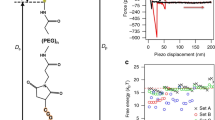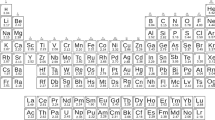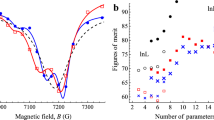Abstract
TYPICALLY, enthalpy and entropy estimates from kinetic and equilibrium data are highly correlated, varying in a linear fashion with one another (enthalpy–entropy compensation effect). This effect can be readily explained in most cases simply as a statistical or data handling artefact. The statistical analysis presented here reveals three novel insights. First, the enthalpy and entropy parameter estimates are highly correlated, such that estimated correlation coefficients > 0.95, say, do not imply chemical causation. Second, enthalpy and entropy estimates are distributed by experimental and measurement errors in elliptical probability regions that are very elongated and appear as lines. The slope of such lines is the harmonic mean of the experimental temperatures. Third, estimates of enthalpy and free energy at the harmonic mean of the experimental temperatures are not statistically correlated, so any observed structured variation between these parameter estimates arises from the chemical effect alone. Note that, since the thermodynamic potentials are interrelated by the Maxwell relationships, a correlation between any two potentials can be transformed to give the corresponding correlation between any other two. We now discuss these results to resolve a number of issues concerning a much disputed data set.
This is a preview of subscription content, access via your institution
Access options
Subscribe to this journal
Receive 51 print issues and online access
$199.00 per year
only $3.90 per issue
Buy this article
- Purchase on Springer Link
- Instant access to full article PDF
Prices may be subject to local taxes which are calculated during checkout
Similar content being viewed by others
References
Leffler, J. E., and Grunwald, E., Rates and Equilibria of Organic Reactions, 315–402 (Wiley, New York, 1963).
Leffler, J. E., J. org. Chem., 20, 1202–1231 (1955).
Craft, M. J., and Lester, C. T., J. Am. chem. Soc., 73, 1127–1128 (1951).
Leffler, J. E., Nature, 205, 1101–1102 (1965).
Exner, O., Coll. Czech. chem. commun., 29, 1094–1113 (1964).
Exner, O., Nature, 201, 488–490 (1964).
Hammett, L. P., Physical Organic Chemistry, 391–408 (McGraw-Hill, New York, 1970).
Lumry, R., and Rajender, J., Biopolymers, 9, 1125–1227 (1970); J. phys. Chem., 75, 1387–1401 (1971).
Exner, O., Coll. Czech. Chem. Commun., 37, 1425–1444 (1972).
Exner, O., Nature, 227, 366–367 (1970).
Blackadder, D. A., and Hinshelwood, C., J. chem. Soc., 2720–2727 (1958).
Leffler, J. E., J. org. Chem., 31, 533–537 (1966).
Brown, R. F., J. org. Chem., 27, 3015–3026 (1962).
Author information
Authors and Affiliations
Rights and permissions
About this article
Cite this article
KRUG, R., HUNTER, W. & GRIEGER, R. Statistical interpretation of enthalpy–entropy compensation. Nature 261, 566–567 (1976). https://doi.org/10.1038/261566a0
Received:
Accepted:
Published:
Issue Date:
DOI: https://doi.org/10.1038/261566a0
This article is cited by
-
Disordered enthalpy–entropy descriptor for high-entropy ceramics discovery
Nature (2024)
-
Stereoelectronic effects in stabilizing protein–N-glycan interactions revealed by experiment and machine learning
Nature Chemistry (2021)
-
Grain-growth mediated hydrogen sorption kinetics and compensation effect in single Pd nanoparticles
Nature Communications (2021)
-
Thermal degradation kinetics of carotenoids: Acrocomia aculeata oil in the context of nutraceutical food and bioprocess technology
Journal of Thermal Analysis and Calorimetry (2021)
-
Interdependence of the Hammett and isokinetic relationships: a numerical simulation approach
Monatshefte für Chemie - Chemical Monthly (2021)
Comments
By submitting a comment you agree to abide by our Terms and Community Guidelines. If you find something abusive or that does not comply with our terms or guidelines please flag it as inappropriate.



